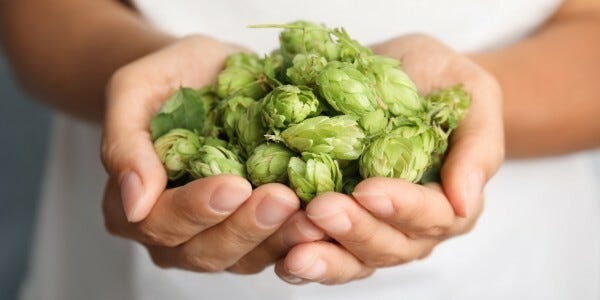
Humulus lupulus. It may sound like something you’d expect to read in a Harry Potter book, but believe it or not, this is the Latin name of the plant that hops – famed for its sleep promoting, nervous system calming, and beer brewing properties - comes from. Let’s learn more.
What are hops?
Hops are green, cone-shaped flowers that are traditionally grown in the Northern Hemisphere1. Most notable for their role in brewing beer[1], thanks to their bitter flavour and their ability to keep beer fresher for longer (yes, let’s just get that out the way), they’re also used in a totally non-alcoholic format to calm the nervous system and support restful sleep[2].
History of hops: kicking back medieval style
Hops have been used since the Middle Ages, when anecdotal evidence suggests people began noticing that field workers who cultivated hop plants tended to fall asleep on the job more than usual. Their work was no more physically demanding than any other fieldwork, so people began to wonder if hops had sedative properties[3].
However, it was the 11th century when hops really became prevalent, thanks to its role in brewing beer. It was particularly popular in Germany, where the Reinheitsgebot (the German beer purity law) was formulated in 1516, which stated that beer could be made only of malt, hops, and water[3].
In the 19th century, hops became more studied for its calming properties and ability to support sleep. In fact, hops became so renowned for its relaxation properties that even Great Britain’s King George III is believed to have slept on hop-filled pillows to help calm him down[4].
Why do hops relax you?
These days, hops are still used to support restful sleep and calm the nervous system, thanks to its bitter resins. The resins help enhance the activity of the body’s Gamma-aminobutyric acid (GABA) – this is a neurotransmitter that the body produces to promote relaxation[2].
Benefits of hops
Consuming hops has been shown to help relax people and support sleep. A few studies have been performed where people were given non-alcoholic beer to drink with dinner, and the results suggested that the consumption of hops before bed resulted in improved sleep habits and a calmer mind[5,6].
What does hops do for the body?
Hops is your friend if you are seeking a way to support relaxation and calm your mind. If you’re experiencing sleep challenges or have a lot on your mind (and let’s face it, the two are often interlinked), then a supplement like hops can be helpful in providing support with achieving a calm, restful night’s sleep.
Does hops help with feelings of anxiety?
Hops has been shown to help reduce symptoms of stress, restlessness and nervous tension when taken consistently[7]. It can be taken in supplement format and is also a popular ingredient in herbal tea, which has the added benefit of offering a sensorial hot drink experience, so consider hops tea before bed to promote relaxation and support nervous system health.
References:
- https://www.dpi.nsw.gov.au/__data/assets/pdf_file/0007/712717/hops-guide-for-new-growers.pdf (page 3)
- https://www.ncbi.nlm.nih.gov/pubmed/22849837
- Karabín M, Hudcová T, Jelínek L, Dostálek P. Biologically Active Compounds from Hops and Prospects for Their Use: Biologically active compounds from hops. Comprehensive reviews in food science and food safety. 2016;15(3):542-567. doi:10.1111/1541-4337.12201http://cms.herbalgram.org/herbalgram/issue87/article3559.html?ts=1552008445&signature=e26a68d1258d0ff5d7bf7312dad4954d
- http://cms.herbalgram.org/herbalgram/issue87/article3559.html?ts=1552008445&signature=e26a68d1258d0ff5d7bf7312dad4954d
- Franco L, Sánchez C, Bravo R, et al. The sedative effect of non-alcoholic beer in healthy female nurses. PLoS One. 2012;7(7):e37290. doi:10.1371/journal.pone.0037290Franco L, Bravo R,
- Galán C, Rodríguez AB, Barriga C, Cubero J. Effect of non-alcoholic beer on subjective sleep quality in a university stressed population. Acta Physiol Hung. 2014;101(3):353-61. doi:10.1556/APhysiol.101.2014.3.10
- Kyrou I, Christou A, Panagiotakos D, et al. Effects of a hops (Humulus lupulus L.) dry extract supplement on self-reported depression, anxiety and stress levels in apparently healthy young adults: a randomized, placebo-controlled, double-blind, crossover pilot study. Hormones (Athens). 2017;16(2):171-180. doi:10.14310/horm.2002.1738
